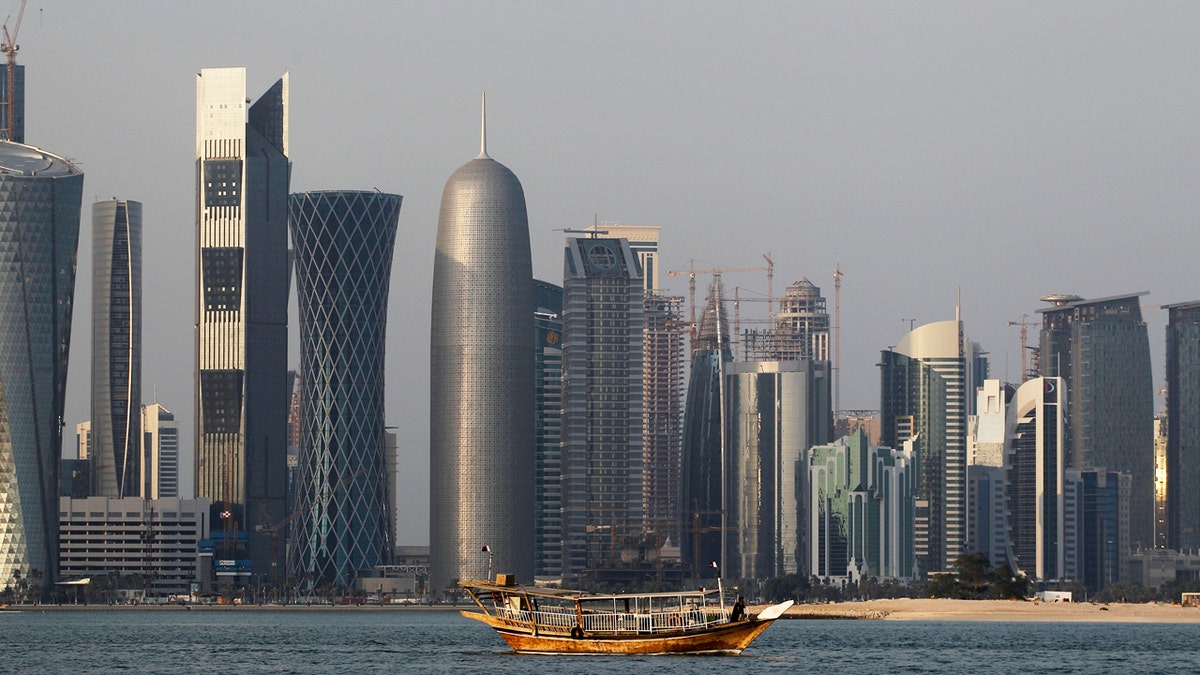
In this Thursday Jan. 6, 2011 file photo, a traditional dhow floats in the Corniche Bay of Doha, Qatar, with tall buildings of the financial district in the background. (AP)
DUBAI, United Arab Emirates – A deal between the United States and Qatar for F-15 fighter jets and a visit to Doha by two American warships on Thursday showed the vital military links Washington maintains with a country now in a dispute with several other Arab nations.
Qatar remains the home of some 10,000 American troops at a major U.S. military base in the Mideast. So far, the dispute between Doha and nations led by Saudi Arabia has yet to shake that partnership, though cracks are showing in responses from President Donald Trump and his administration.
Meanwhile, the United Nations agency overseeing global air travel has acknowledged receiving complaints from Qatar about other nations cutting off flying routes for its long-haul state carrier, Qatar Airways. Those cuts have seen global air travel disrupted and threatened the airline's revenues.
In Washington, Qatari Defense Minister Khalid bin Mohammed al-Attiyah met Wednesday with U.S. Defense Secretary Jim Mattis and signed a deal for F-15 fighter jets it described as being worth $12 billion.
"Qatar and the United States have solidified their military cooperation by having fought together side by side for many years now in an effort to eradicate terrorism and promote a future of dignity and prosperity," al-Attiyah said in a statement.
The U.S. military announced a similar $21.1 billion deal in November for 72 F-15QA fighter jets for Qatar in the waning days of the Obama administration. It wasn't immediately clear if the two deals were one in the same. Qatari officials did not immediately respond to questions Thursday, though a State Department official connected the two sales.
The signing comes as Mattis has offered his support to Qatar in the past. Mattis formerly oversaw the U.S. military's Central Command, whose forward operating base is at the vast al-Udeid Air Base in Qatar. That base serves an important role in managing the fight against the Islamic State group in Iraq and Syria, as well as war in Afghanistan.
The State Department official, speaking on condition of anonymity to discuss an internal matter publicly, said the sale will take years to complete.
Meanwhile, the USS Chinook, a coastal patrol ship, and U.S. Coast Guard Cutter Baranof both were in Doha on Thursday, said Cmdr. Bill Urban of the U.S. Navy's Bahrain-based 5th Fleet. He called the trip a "routine port visit."
Qatar's state-run news agency described the presence as being part of a "joint exercise" with the Qatari navy. Urban later told The Associated Press that the U.S. Navy did "not have a scheduled exercise at this time."
"U.S. 5th Fleet ships conduct similar port visits throughout the region as part of our normal operations," Urban said.
The crisis between Qatar and its Arab neighbors, all U.S. allies, has put America in a delicate situation. Mattis has described Qatar as "moving in the right direction," while U.S. Secretary of State Rex Tillerson said called for Arab Gulf nations to remain united.
Trump, meanwhile, repeatedly has accused Qatar of funding terrorist groups, one of the main allegations levied by Saudi Arabia, the United Arab Emirates, Egypt and Bahrain when they initially cut diplomatic ties on June 5.
Qatar long has been trying to secure its relations with the U.S., whether through hosting the American military base or an office for the Taliban, said David B. Roberts, an assistant professor at King's College London who recently wrote the book "Qatar: Securing the Global Ambitions of a City-State."
The recent mixed message from the Trump administration, however, has it working even harder, he said.
"Qatar long has wanted to make itself a particularly important ally for America where it can," Roberts said. "It has been a bit of a pain at times in other things ... but the American angle has often been very important."
The crisis has seen Saudi Arabia cut off its land border with Qatar, the host of the 2022 FIFA World Cup.
After an initial run on grocery stores by nervous residents, Qatar has organized dairy shipments from Turkey while Shiite power Iran also has begun shipping in food. Qatar's ties with Iran, with whom it shares a major offshore natural gas field, is another criticism of the Arab countries.
Doha also has begun running cargo shipments from ports in Oman after seeing its sea routes to the UAE's major ports cut off. But its cutoff air travel routes remain problematic.
Typically, Qatar Airways flights West flew over Saudi Arabia. But with that airspace now closed off, the airline is flying longer routes over Iran and Turkey. Its regional feeder flights in Saudi Arabia and the UAE also have been cut off.
Qatar has filed complaints to the Montreal-based International Civil Aviation Organization, a U.N. agency, calling the Arab nations' refusal to let it fly through their airspace illegal. In a statement, the organization said it would host ministers and senior officials from Qatar, Saudi Arabia, Egypt, the UAE and Bahrain on Thursday.
"For now, we are working to bring these states together towards a solution which satisfies both their current regional concerns and the global needs and expectations of passengers and shippers," the statement said.
However, it remains unclear how the organization that doesn't issue binding rules could force the Arab nations to reopen their airspace to Qatar.
"If I was betting now, I would suggest this is going to go on for a very long time," Roberts said of the crisis.
___
Associated Press writer Josh Lederman in Washington contributed to this report.
___
Follow Jon Gambrell on Twitter at https://twitter.com/jongambrellAP . His work can be found at http://apne.ws/2galNpz .






































